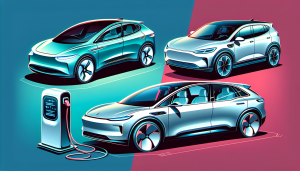===
Getting your first car is an exciting milestone in life, but it can also be a bit overwhelming with so many options to choose from. As a new driver, it’s important to consider factors such as safety features, budget, fuel efficiency, and maintenance. In this article, we’ll provide you with valuable tips on how to choose the perfect vehicle for your needs and preferences.
Benefits of Buying a First Car
Owning your first car provides a sense of independence and freedom, allowing you to travel wherever and whenever you want. You no longer have to rely on public transportation or others for rides. Having your own vehicle also offers convenience and saves you time, as you can run errands or commute to school or work on your own schedule.
Factors to Consider Before Purchasing
Before purchasing your first car, consider factors such as your budget, lifestyle, and driving needs. Think about whether you need a compact car for city driving or a larger vehicle for long-distance trips. Consider features like fuel efficiency, safety ratings, and maintenance costs. Make a list of must-have features and prioritize them when looking at different models.
Safety Features to Look for in a Car
Safety should be a top priority when choosing a first car. Look for vehicles with advanced safety features such as airbags, anti-lock brakes, traction control, and electronic stability control. Consider cars with good crash test ratings and strong safety structures. Features like blind-spot monitoring, lane departure warning, and rear-view cameras can also enhance your safety on the road.
Best Makes and Models for New Drivers
Popular makes and models for new drivers include Honda Civic, Toyota Corolla, Ford Fiesta, and Hyundai Elantra. These vehicles are known for their reliability, fuel efficiency, and affordable maintenance costs. They also offer good resale value, making them a smart choice for first-time car owners.
Budget-Friendly Options for First Cars
For those on a tight budget, consider buying a used car or looking for certified pre-owned vehicles. You can save money by purchasing from private sellers or exploring dealership specials and promotions. Keep in mind that older cars may require more maintenance, so factor in potential repair costs when making your decision.
Fuel Efficiency and Eco-Friendly Cars
Fuel efficiency is important for new drivers, as it can save you money on gas in the long run. Consider hybrid or electric vehicles for a more eco-friendly option. These cars produce fewer emissions and reduce your carbon footprint. Look for vehicles with high MPG ratings to maximize your fuel savings.
Tips for Test Driving Vehicles
Before making a final decision, test drive several vehicles to get a feel for how they handle on the road. Pay attention to factors like comfort, visibility, steering responsiveness, and braking. Test different driving scenarios, such as highway driving, city streets, and parking. Don’t be afraid to ask questions and take your time to make an informed choice.
How to Negotiate a Good Deal
When negotiating a deal for your first car, research the market value of the vehicle you’re interested in and come prepared with a budget in mind. Be willing to walk away if the price is too high. Consider getting pre-approved for a loan to show that you’re a serious buyer. Don’t forget to factor in additional costs like taxes, registration fees, and insurance.
Insurance Considerations for New Drivers
As a new driver, insurance rates may be higher due to lack of driving experience. Shop around for quotes from different insurance companies to find the best rate. Consider factors like your driving record, age, location, and the type of car you’re insuring. Look for discounts for good grades, completing driver education courses, or bundling policies.
Maintenance Tips for First-Time Car Owners
To keep your first car running smoothly, follow a regular maintenance schedule for tasks like oil changes, tire rotations, and brake inspections. Keep track of your vehicle’s service history and address any issues promptly to prevent costly repairs down the road. Learn basic car care skills like checking fluids, changing wiper blades, and replacing air filters.
Must-Have Accessories for Your First Car
Accessorize your first car with items like a phone mount, emergency roadside kit, jumper cables, and a car charger. Consider adding floor mats, seat covers, and a sunshade to protect your vehicle’s interior. Invest in a quality car stereo system for entertainment on the go. Personalize your car with fun decals or bumper stickers to make it your own.
Resources for Finding the Perfect Vehicle
Use online resources like car buying websites, dealer websites, and social media platforms to research and compare different vehicles. Read reviews from other drivers to learn about their experiences with specific makes and models. Visit local dealerships to see cars in person and talk to sales representatives about your options. Don’t hesitate to ask for recommendations from friends and family members.
===
Choosing the perfect first car is an exciting journey that can be made easier with the right information and guidance. By considering factors like safety, budget, fuel efficiency, and maintenance, you can find a vehicle that meets your needs and preferences. Remember to test drive multiple cars, negotiate a good deal, and prioritize safety features when making your decision. With proper research and preparation, you’ll be cruising in your dream car in no time!
